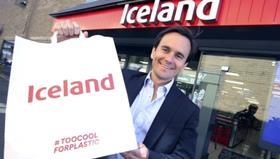
This year has seen a commitment by the majority of major UK supermarkets to reduce the amount of plastic used in packaging. Iceland, for example, announced its intentions to eliminate plastic packaging across all of its own-label products by 2023, while many other supermarkets have signed up to the UK Plastics Pact, targeting the implementation of 100 per cent reused, recycled or composted plastic in packaging by 2025.
Despite this many have remarked that, while these steps are a good start, more decisive action is needed. As Louise Edge, senior oceans campaigner at Greenpeace UK suggested, 'more radical and comprehensive policies' are needed to tackle the plastic waste crisis.
For fresh produce suppliers this certainly creates a challenge, but also opportunity. The critically acclaimed Blue Planet 2 captured the imagination of a generation, with the general public becoming increasingly aware of the impact of plastic on the environment, in turn putting pressure on retailers and suppliers to respond. Now is the time for brands to react and take advantage of this opportunity to be seen as a leader on eco-credentials within the sector.
The signs are positive, as just last month, Morrisons, the UK’s fourth largest supermarket chain, revived the traditional brown paper bag for loose fresh fruit and vegetables, which it claims could save 150 million plastic bags per year. It also launched a campaign, linked to its loyalty scheme, to encourage customers to bring their own containers to its butcher and fishmonger counters.
Nevertheless, for certain products, plastic is a preferred packaging option to protect vulnerable items from contamination and damage during transit. The plastic packaging sector has long claimed that its products help to reduce food waste by increasing shelf life through technologies such as modified atmosphere packaging. It’s all about finding a balance that suits all.
While quality and safety are a top priority, increased transparency with consumers will only help to foster brand loyalty. The retailers that work closest with suppliers to develop these sought after innovative and environmentally friendly products will be ahead of the curve, and I’m sure their sales figures will provide testament to that. Put simply, assuring quality is maintained from both a manufacturing and an ethical perspective will only benefit retailers and the consumer in the long run.
With consumers now able to interact with brands across a range of platforms, and competition across the sector increasing all the time, the demands for information about the origin and manufacturing process of products has never been higher. In the US, retailers are taking major steps to improve transparency, for example through technologies such as SmartLabelTM. This allows customers to scan QR codes in store and gain instant access to additional product information that isn’t not on the pack.
There is some resistance to change from fresh produce suppliers but they need to contribute to this innovation and see it as an opportunity – or risk losing sales of added-value products to environmentally conscious customers who will instead opt for paper bags in store or their use their own packaging.
It is important that brands in the UK continue to invest in such initiatives. This will help attract customers that are more conscious about the environmental credentials of the food with a welcome boost in sales to match. Now is the time for retailers to be bold and reap the rewards. Those that are prepared to reduce the amount of plastic in packaging, while retaining product freshness and quality, stand to win the loyalty of a whole new generation of environmentally conscious consumers.






No comments yet